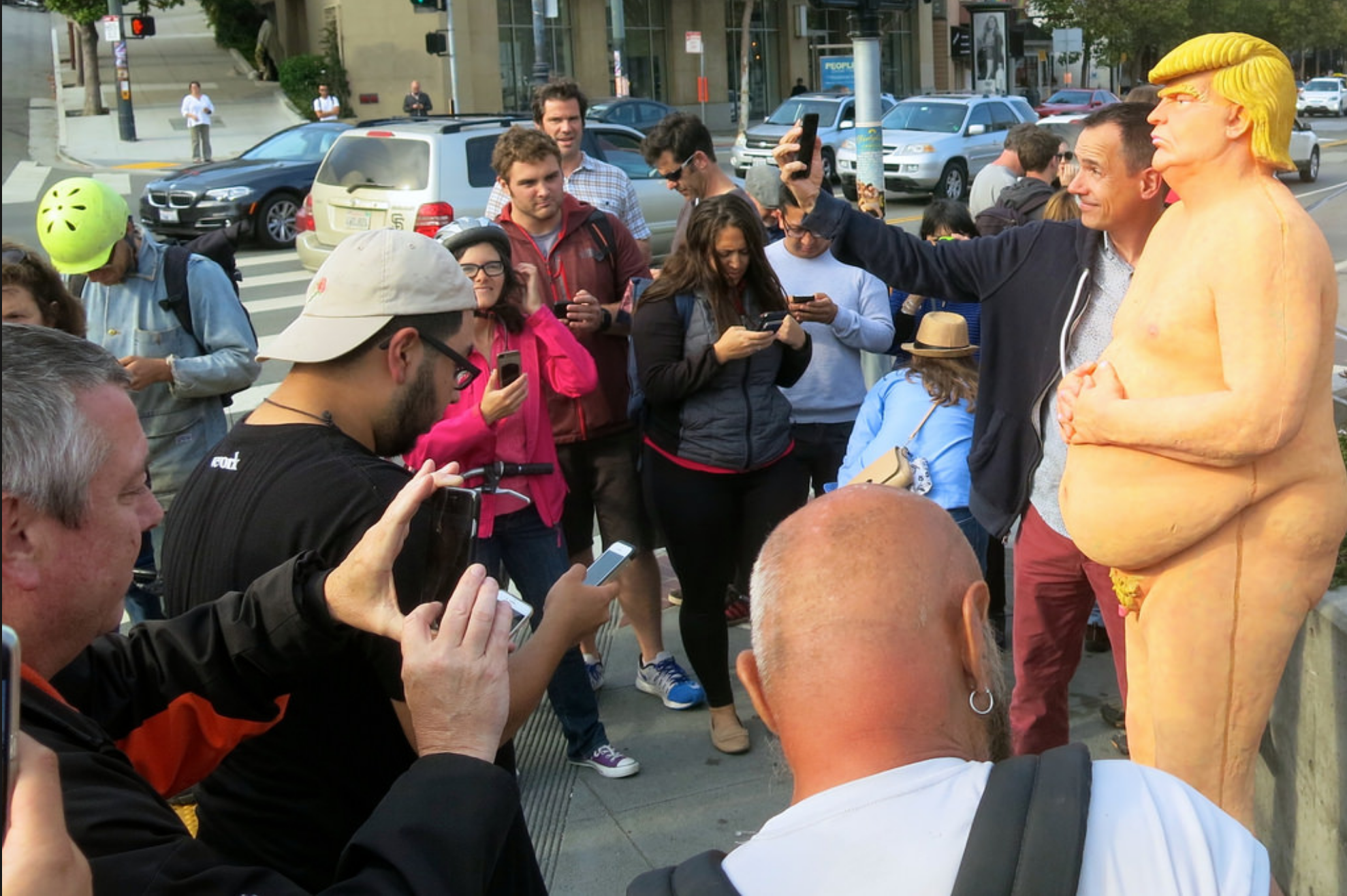ESSAY: Those Naked Donald Trump Statues? They Have a Secret History
/Credit: https://www.flickr.com/photos/gazeronly/28457759944
By Alysia Garrison
When naked statues of Donald Trump popped up in American cities last summer, unleashing a barrage of pro and counter attacks, it seemed like the latest outrageous twist in an outrageous election season—a phenomenon uniquely reflective of the here and now.
But far from being unique to this twenty-first century moment, the life-sized statues—one of which sold last month for $22,000—hark back to the 18th century, an echo of the critical genre known as “secret history.”
What is secret history? Difficult to nail down, yet increasingly of interest to humanities scholars, secret history narratives are united in their goal of making public what the powerful want to keep private. Promising behind-the-scenes revelations, they range in tone from gossipy to satirical, empirical to conspiratorial. The ultimate goal: to debunk the aura of mystery on which power thrives. In my study of the genre, I’ve come to see it as integrally tied to citizen action—the act of refusing to remain passive and obedient, the act of claiming ownership of secrets in which one has an interest.
Many of the major eighteenth century practitioners of secret history were novelists, the likes of Eliza Haywood, Daniel Defoe, Delarivier Manley, and Jonathan Swift. One well known example appears in Swift’s Gulliver’s Travels (1726), in Part Three of Gulliver’s journey to the island of Glubbdubdrib, in the aptly titled “Ancient and Modern History corrected.” Here Gulliver parlays with ancient and modern ghosts from the age of Aristotle to Descartes who supply a counter-history of corruption and “contemptible accidents” as drivers of the world’s “great enterprises and revolutions.”
Gulliver laments discovering the base springs and motives of great events as he satirizes the kings and ministers whose power derives from blunders, tom foolery, and sexual indiscretions rather than majesty. The intimacy between eighteenth century satire and secret history enables the anecdotal sting of Gulliver’s Travels, and in the 21st century, naked Trump.
Deriving from the Greek anekdota, or “things unpublished,” the secret history first appeared in English print culture 50 years earlier, in 1674 with the anonymous translation of Procopius’s Anecdota (c. A.D. 550) as The Secret History of the Court of the Emperor Justinian during the restoration of Charles II. An implicit comparison between the Roman emperor Justinian and the English monarch was meant to discredit the king whose secret dealings and sexual scandals could malign the course of English politics.
The author’s headnote promised to supply the motives and causes behind public events; things passed over in silence, or causes he deemed “too secret” to circulate in manuscript or “commit to any friend.” The Anecdota undermined orthodoxy about the absolutism of arbitrary rule, now disclosed as subject to the personal whims and motives of rulers.
By the mid-eighteenth century, anecdota had become synonymous with “secret history,” defined in Ephraim Chambers’s eighteenth century Cyclopedia as what “relate to the secret Affairs and Transactions of Princes; speaking with too much Freedom, or too much sincerity, of the manner and conduct of Persons in Authority, to allow of being made publick.” In early modern theories of sovereignty, the sovereign exercises its power by being in possession of state secrets, or arcanum imperii—what the state does not wish to share with its people. The anecdotal imparts little details marginalized by grand narratives and abstracted by the sublimity of state power. When the anecdote is released from its separation as a private memory, and enters the record as a public secret, it is shared with a society that wishes to be transparent to itself.
Now flash forward to the present day. With naked Trump, the anarchist collective Indecline followed in the footsteps of secret history practitioners, providing a counter-narrative in the form of performance art to disrupt the precarious displays of emperors, ministers, kings, and statesmen. Indeed, this is precisely the kind of subversive counter-conduct against the powerful that is fundamental to the genre.
In declaring that “The Emperor Has No Balls,” Indecline invokes Hans Christian Anderson’s cautionary tale “The Emperor’s New Clothes”— a play on words with the clear implication that Trump is both cowardly and delusional. First published in 1837, “The Emperor’s New Clothes” lampooned the European royal courts’ preoccupation with pomp rather than substance, a revolt against royalism that has origins in the English Whig tradition of secret history. While Trump’s naked privacies are on display, what stands out are not the “truths” revealed by his state of undress, but what Trump is wearing: a masonic ring. The emperor, it seems to say, is in possession of secrets – secrets he is unwilling to share with his public even as they lie on the surface for all to see.
Now days before the vote, the secret history appears again, to have rocked the US election. Famously this election season’s “October surprise” included Trump’s infamous hot mic footage and revelations of his lewd behavior by nine women. Having blocked self-opposition research early in his campaign, which could have brought these disclosures to light, they have now promised to bury his candidacy for good. And the naked Trump conceit has stuck: a few days ago a photographer staged naked people standing on their head to signal a world upside down with Trump. As copies of his tax returns are leaked and naked Trump sells for $22,000 at Julian’s auctions in Los Angeles, the power of the secret history—the public circulation of private affairs—has never seemed more potent.
Alysia Garrison, Ph.D., is an Assistant Professor of English at Dartmouth College and a Public Voices Fellow for the OpEd Project.










